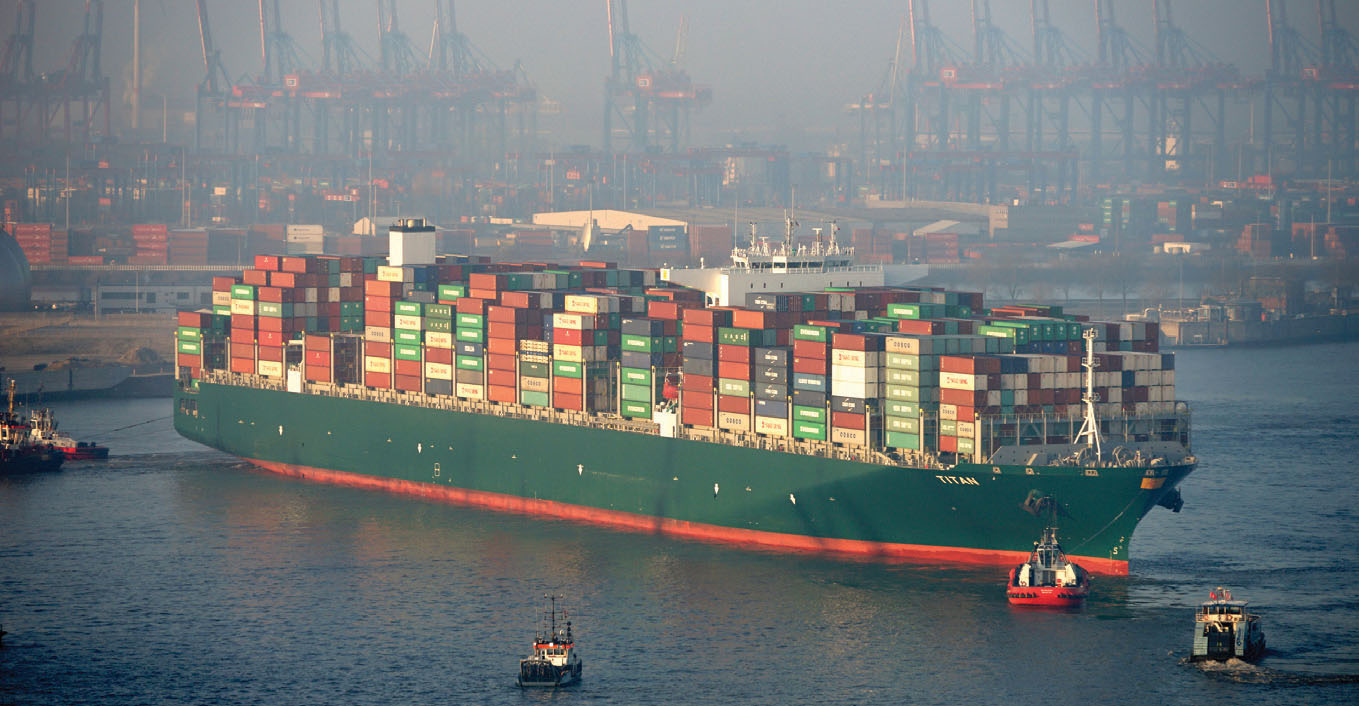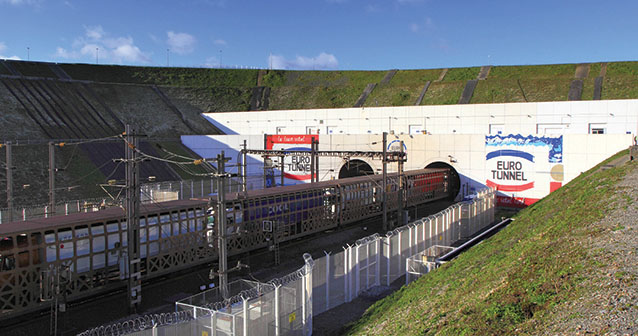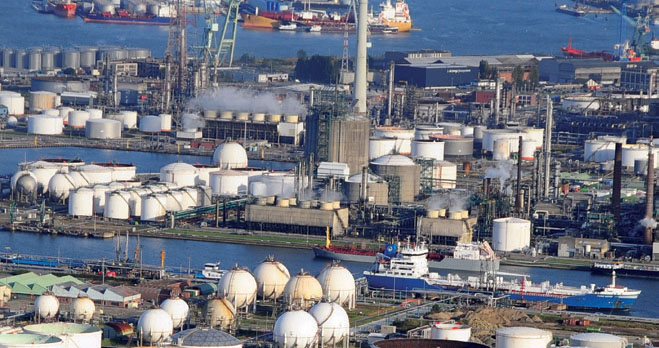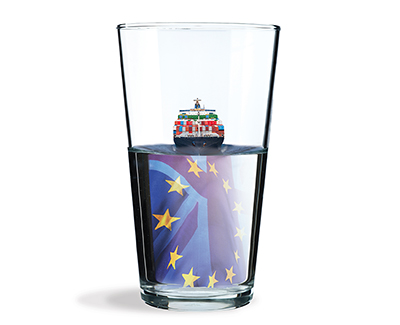European Logistics Update: The Glass is Half Full

New political developments from both sides of the Channel and the Atlantic still have shippers and logistics services providers scratching their heads. But where some see an element of uncertainly and discord, others see bright new opportunity.
Many carriers and logistics service providers find cause for concern in the new U.S. administration’s announcements because President Trump has threatened Europe with trade restrictions. A protectionist policy would certainly have effects on them, since they’re global players who are closely linked to customers all over the world through the international supply chains.
One of them is UPS, which recently announced a series of enhancements to its network and infrastructure. UPS says it plans to reduce transit times between more than 350 cities in 26 countries across Europe as part of a $2 billion investment program between 2014 and 2019. The company has already completed one-third of this network expansion and redesign program, with new facilities announced in Belgium, Denmark, France, Germany, the Netherlands, Poland, Sweden and the UK.
At a recent event held at LogistikCluster Nordrhein-Westfalen in Duisburg, Germany, Frank Sportolari, president of UPS Germany and a member of the board of the American Chamber of Commerce in Germany, emphasized that free trade is essential for the business of global logistics service providers.
“It’s never good to set up any hurdles,” says Sportolari. “We should not forget that we live in a globalized world.” At the same time, Sportolari did express his support for the president’s intention to invest in an infrastructure program, lower taxes and reduce bureaucracy. The infrastructure program could be of interest to foreign investors, as well, because private investors are to be involved.
EU: Be a player, not a follower
According to Dr. Raimund Klinkner, president and chairman of BVL in Germany, Europe’s largest logistics association, foreign trade and the international division of labor are just as important for American economic development as they are for Europe.
Klinkner is convinced that, as an experienced entrepreneur, Donald Trump is aware that pure protectionism cannot be the road to economic success. “Realism and sound judgement are required if Trump is to deliver what he promised the people during his campaign: jobs and prosperity,” says Klinkner, who added that he’s optimistic that Europe will once again build on its strengths and get back to being an active player instead of a “follower” of the United States.
“To achieve that, European unity is more important than ever, in economic policy as well as in questions of security,” says Klinkner. “Of course, it’s harder to take proactive, cooperative action than to play the role of follower—but it also offers more potential for success.”
Klinkner’s American colleague Moe Ergin, BVL’s representative in Chicago, fears that a breakdown in U.S./EU trade could have other effects than just the free flow of clients’ goods. “Our biggest fear as a German company in the United States that strives to have a multinational workflow is the proposed restriction on migrant workers wishing to work in the country and concentrating on giving jobs to Americans,” he said.
German businesses, including many logistics service companies, provide many jobs in the United States and contribute to the country’s growth. According to statistics from the U.S. Department of State, U.S. affiliates of German companies employed over 670,000 American workers in 2015. Deutsche Post DHL is one of them and has been strongly committed to the U.S. market for many years.
For example, DHL Express recently announced that it would be opening up around 900 new positions as it completes the latest $108 million expansion of its Americas Hub at the Cincinnati/Northern Kentucky Airport. Additional sorting capacity and projected growth in shipments are expected to boost the hub’s workforce to more than 3,300 employees.
EU ports depend on free trade
The European seaports play a central role in channeling the trans-Atlantic flow of goods. Introducing customs duties or any restraints on trade would have an immediate effect on their operations.
Germany’s largest universal port in Hamburg handled 363,000 twenty-foot equivalent units (TEU) of cargo on its way to and from the United States in 2016—an 11.1% gain over the year before. For Hamburg’s container shipping, the most important ports on the U.S. East Coast are New York/New Jersey, Savannah, Hampton Roads and Houston. Important seaports on the West Coast are Los Angeles, Long Beach, Seattle/Tacoma Alliance and Oakland.
The United States is Hamburg’s 4th most important trade partner for container shipping worldwide. Many international firms on both sides of the Atlantic rely on global free trade and ship their imports/exports via the Port of Hamburg. A large share of German exports such as chemicals, food and beverages, machinery, technical equipment, metals and metal products are transported out of Hamburg by ship across the Atlantic.
The CEO of Port of Hamburg Marketing, Axel Mattern, showed his satisfaction about the rising cargo volumes, but also expressed concerns about some pronouncements coming from America.
“Protectionist policy on the part of the United States would hurt not only European ports, but also the American ports they trade with,” says Mattern. “Trade restrictions are not an instrument that leads to more growth—in fact, just the opposite. We know that from experience, in view of the economic sanctions against Russia. Therefore, we’re calling on the new U.S. government to keep on supporting free trade and a fair partnership with the EU in the future, as well.”
Optimism exists
In terms of volume, the United States remains the most significant market for the Port of Antwerp. In 2016, no less than 22.3 million tons of goods, including 1.18 million TEU of containerized cargo were shipped between the port and the U.S. East Coast and Gulf.
Last year, Antwerp noticed a year-over-year decline of 4% in total U.S. throughput, largely due to a weak 4th quarter for U.S.-bound liquid bulk shipments. Steady growth in westbound breakbulk (+13%) and container transport (+2%) didn’t compensate entirely. However, early indications of rising throughput since the start of the new year are encouraging hopes that the slump at the end of 2016 was temporary and market driven, and the decline was not necessarily a result of the changing political landscape in the United States.

Truck shuttle between the UK and continental Europe.
“Nonetheless, we expect the results of the U.S. presidential election to re-shape trans-Atlantic trade to some extent—although not gravely,” says Yves Adriaensen, Port of Antwerp’s market intelligence analyst. “The general assumption is that the new president’s focus on strengthening domestic manufacturing should further promote our growing breakbulk trade with the United States as well as support our outgoing traffic for semi-manufactures and building materials, while we anticipate the chemicals and plastics market to experience an overhaul—altering the current net westbound to a net eastbound flow.”
However, Adriaensen adds that all of this is tied to the anticipation of continued and smooth trans-Atlantic trade relations. “Although recent dialog did cast some doubt on such a framework, based on past practice we as a port feel we have every reason to be optimistic.”
An opportunity for Free Ports
On the matter of Brexit, some certainly fear the worst, while others see opportunities for the UK to exploit its potential even more so after leaving the EU Customs Union.
A new report released by UK’s Centre for Policy Studies (CPS), for example, says that Brexit would provide the opportunity to create Free Ports across the UK. These areas, although inside the geographic boundary of a country, are considered to be outside the country for Customs purposes. This means that goods can enter and re-exit the port without incurring the usual import procedures or tariffs.
According to Rishi Sunak, a member of the House of Commons, Free Ports are already successful in the United States in the form of over 250 Free Trade Zones that employ 420,000 people and handle $750 billion of merchandise.
“They have played a major role in retaining, re-shoring and expanding domestic manufacturing and boosting trade,” says Sunak, who believes that Brexit and the creation of Free Ports would provide a new opportunity for Britain “that would increase manufacturing output, reinvigorate the North, and promote trade.”
The CPS report goes on to list a number of further possible benefits for the UK. If they were to be as successful as those in the United States, British Free Ports could create more than 86,000 jobs, particularly in areas outside London where economic need is higher. Three quarters of the UK’s 30 largest ports are located in “below average” economic regions and over half of them are among the 25% of the most deprived areas.
Currently, the EU Customs Union and EU State Aid laws effectively prevent Free Ports, while Brexit would make them feasible. The report states that the policy could be implemented quickly and simply: “Free Ports have a broad appeal that could command bipartisan support, allowing the policy to act as a rapid response to Brexit.”
“Foreign Trade Zones are flourishing all around the world, except in the EU,” adds Sunak. “Post Brexit, they could play an important role in signaling Britain’s openness to the world, as well as reconnecting the nation with its proud maritime history.”
Brexit and road haulage
As always, the devil is in the details. The British Road Haulage Association (RHA), for example, is concerned that Brexit could seriously damage Britain’s food supplies, due to the fact that Customs problems could cripple supply chains.
RHA is warning that unless the government negotiates the right Customs controls during forthcoming Brexit talks, the UK’s sensitive food supply could be hurt badly. According to RHA chief executive Richard Burnett, nearly 30% of all food consumed in the UK is trucked from the EU—and at the moment, the process is seamless as far as customs processes are concerned.
“After Brexit, that will no longer be the case, and we have to get the new processes right,” says Burnett. “Otherwise the system for getting food into the country could grind to a halt.”
“We expect the results of the U.S. presidential election to re-shape trans-Atlantic trade to some extent—although not gravely.”
RHA is concerned that long lines of trucks could lead to bottlenecks at ports with not enough experienced staff to cope with a backlog while fresh food supplies rot. “We are not reassured by recent government statements,” Burnett says, referring to recent report released by Her Majesty’s Revenue and Customs (HMRC). “The White Paper suggests that HMRC has a world-class customs service. For EU continental road haulage, it has no system. It will face new challenges and the government must recognize that and assure business that HMRC will have whatever resources it requires to get the job done.”

The Port of Antwerp is Europe’s main hub for the petrochemical industry
Burnett adds that the RHA welcomes the government’s commitment to cross-border trade being as frictionless as possible. “But Customs process for containers and airfreight will not work for the millions of trucks that move through Dover and our ports,” he says. “There are nearly 4.5 million journeys between the UK and Europe each year that are HMRC-free at the moment. These trucks carry jobs, components, products—and 30% of our food.”
Eurotunnel back to normal
There’s little doubt that 2016 was also a turbulent year for Eurotunnel, as traffic from France to the UK through the tunnel was affected by disruptions and delays during the migrant crisis and
Calais strikes.
After the removal of the “Jungle” migrant camp in October of last year and on-going investments in security and automation of border controls, Eurotunnel service is back to normal in 2017. Moreover, Eurotunnel Group was able to announce a new record.
“Last year was the best year in our history,” says Jacques Gounon, chairman and CEO of Groupe Eurotunnel SE. According to Gounon, revenue was up 4% to €1.023 billion, and truck shuttles set another record with 1.64 million trucks, an increase of 11%.
One of the major investment projects was the new security control center at the French terminal in Coquelles, which was inaugurated in January of this year. Further investment programs are on the way: the expansion of both terminals in Coquelles and Folkestone as well as the purchase of three new truck shuttles to increase frequency and capacity.
By 2018, Eurotunnel Le Shuttle Freight aims to have increased its capacity by 20% and will be able to run up to eight departures per hour at peak times. The UK government’s announcement that a 3,600-space truck area will be constructed near the M20 motorway is another clear signal.
“I welcome the Secretary of State for Transport’s announcement of added resilience in the UK motorway network,” adds Gounon. “The UK’s trading relationship with European countries continues to develop, regardless of Brexit. This means that the Channel Tunnel remains vital to the UK, to connect it with Europe and beyond, and it will continue to form a key part of the UK’s transport infrastructure.”
These are hopes shared by many transport and logistics companies and associations, as well. They will put pressure on their governments to prevent disruption of the free flow of goods after Britain leaves the EU.
As Neal Williams, group managing director of UK-base logistics services provider Priority Freight sums it up: “No matter what the new political developments from both sides of the Channel and the Atlantic may bring to Europe and the transport and logistics industry, a time of political change like this will always bring an element of uncertainty. But what we must focus on are the opportunities it also presents.”













